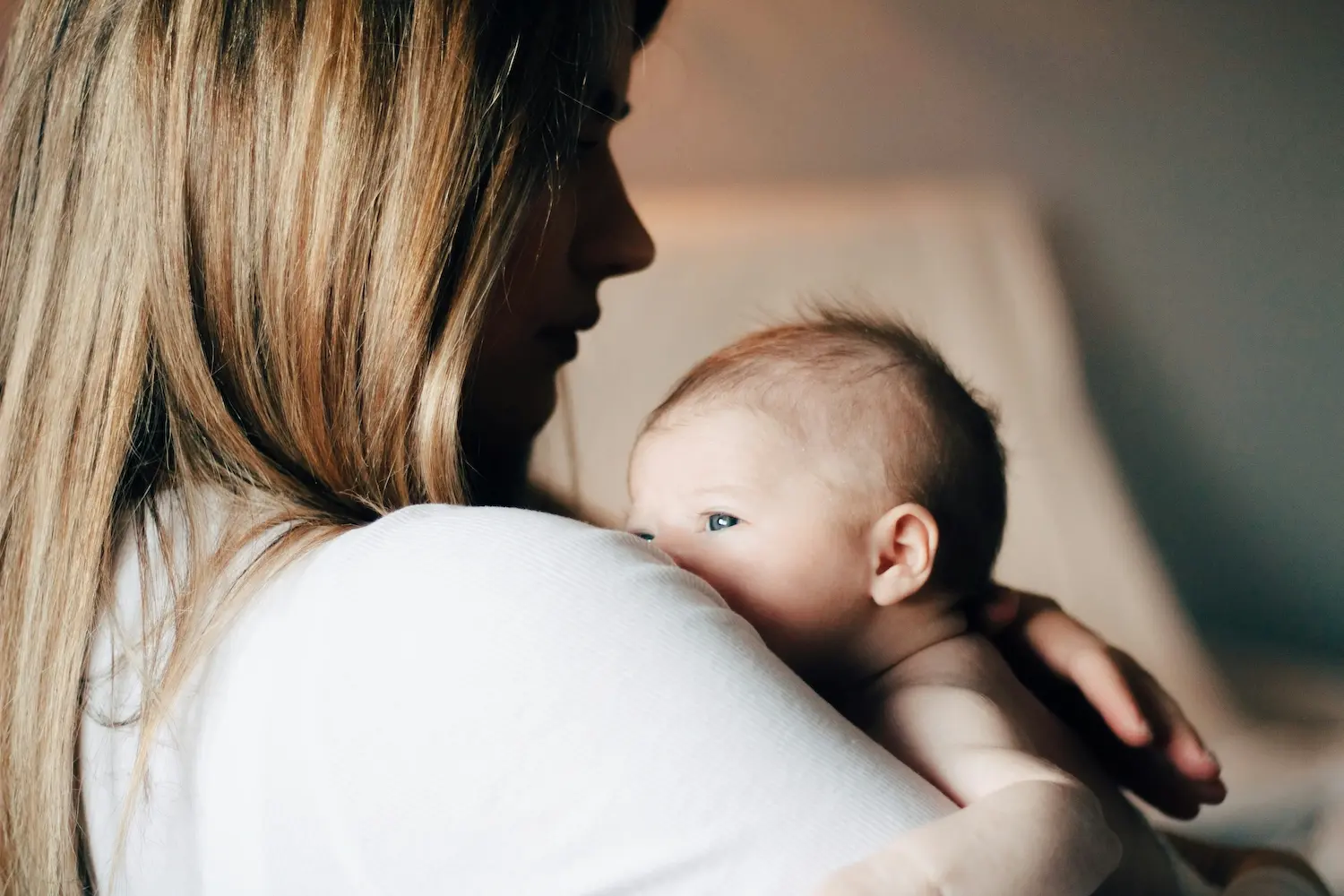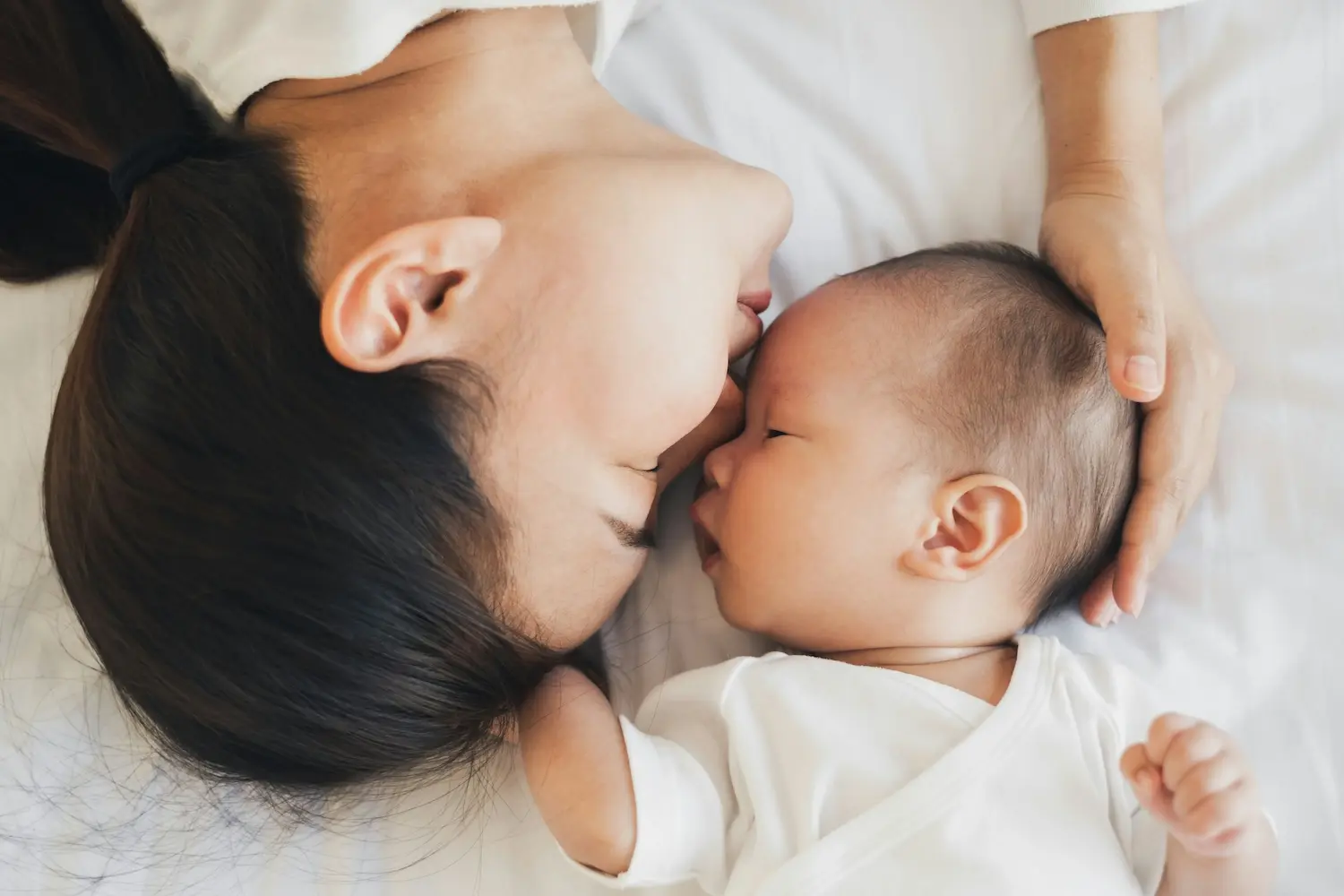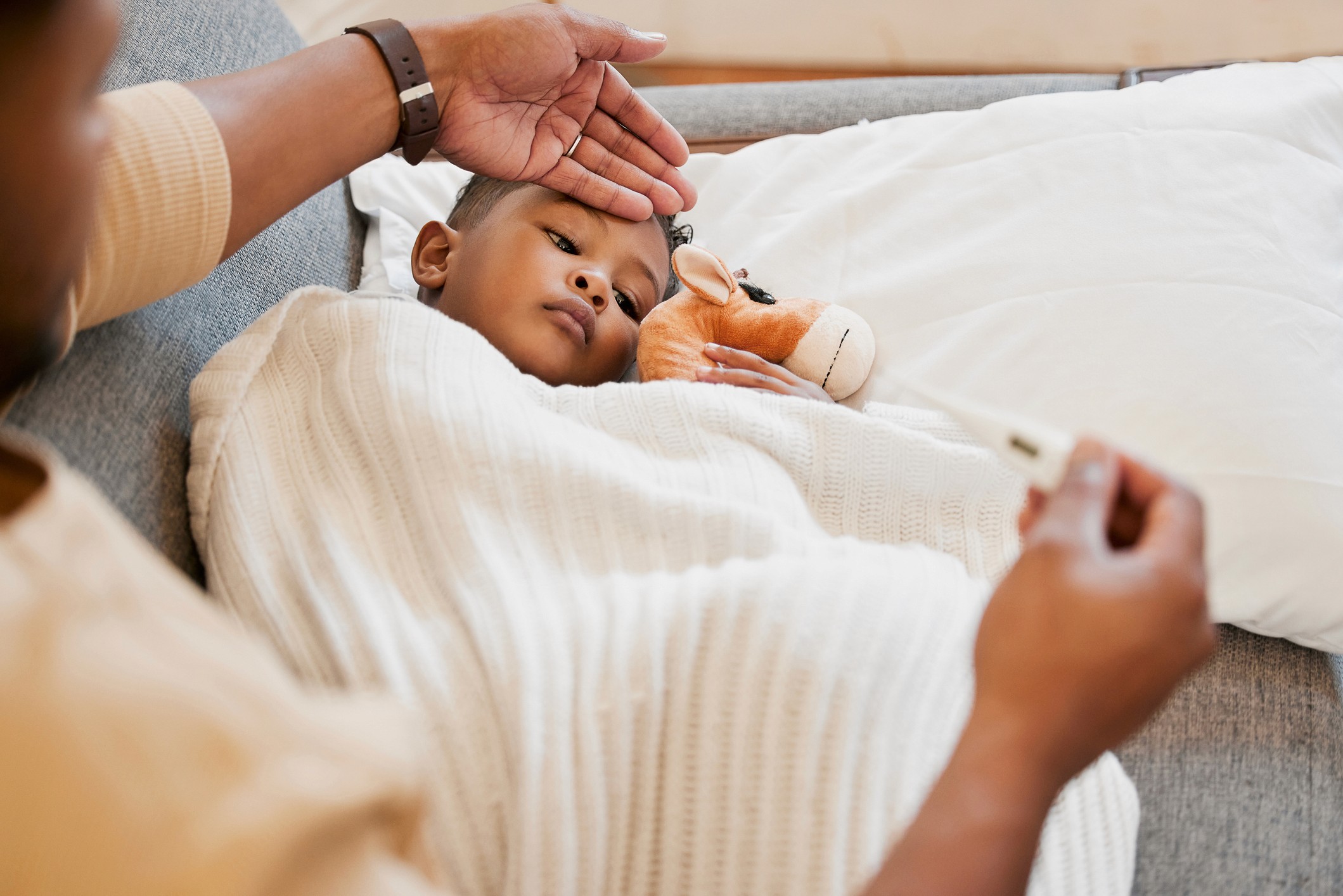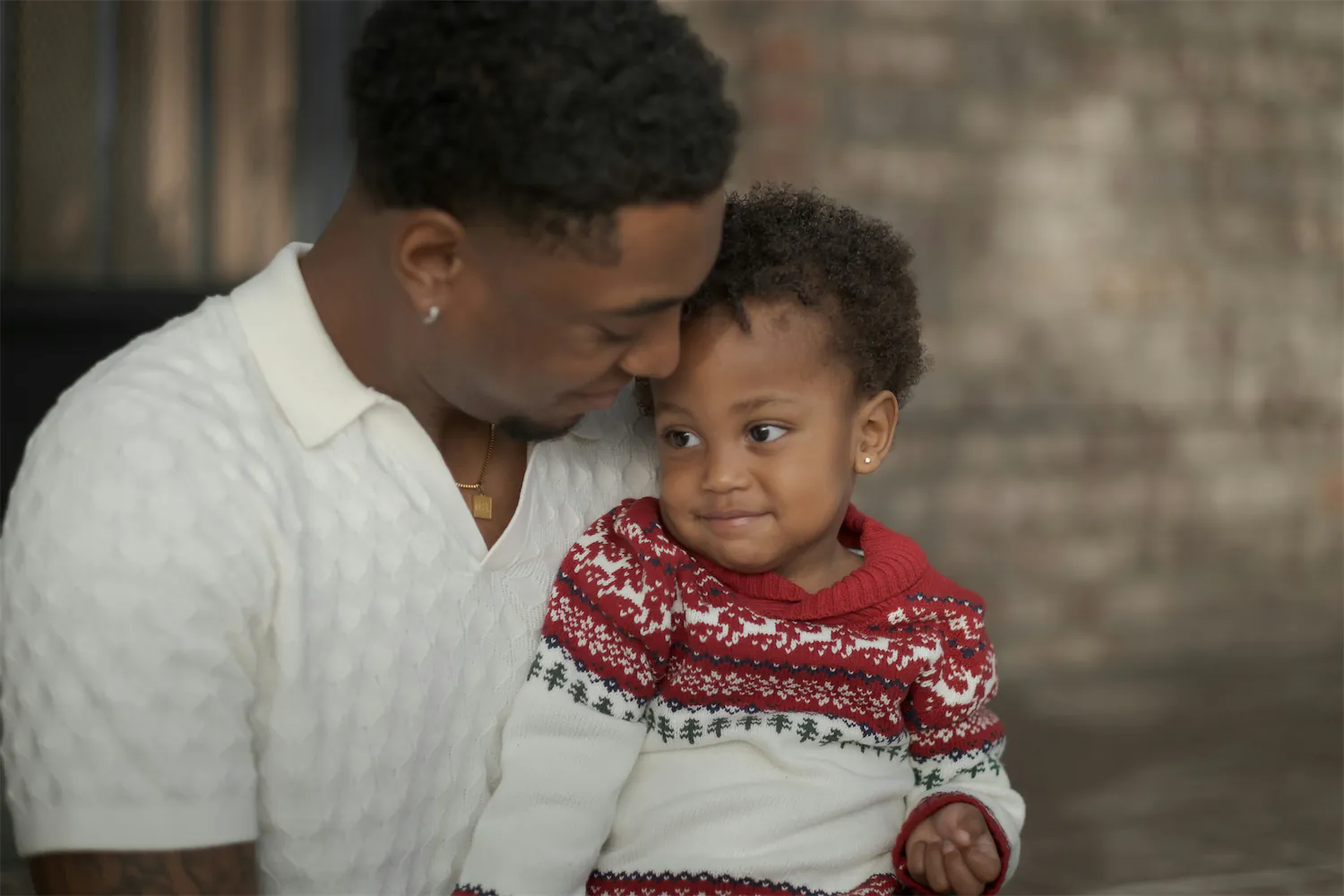Do newborns get sick easily?
Do newborns get sick easily?
Newborns aren't born with a mature immune system. Instead, it takes time, exposure to different germs, and vaccines to help them build up their immunity. For this reason, it can be easy for newborns and young infants to get sick. We'll explore newborns' immune systems a bit more deeply and provide you with ways to care for a sick newborn.
Newborns aren't born with a mature immune system. Instead, it takes time, exposure to different germs, and vaccines to help them build up their immunity. For this reason, it can be easy for newborns and young infants to get sick. We'll explore newborns' immune systems a bit more deeply and provide you with ways to care for a sick newborn.

Megan N. Freeland, PharmD
Content Writer

Dr. Marcy Borieux
Pediatrician



Understanding newborns’ immune systems
The immune system is so effective because it helps your body fight off germs — like viruses or bacteria — to avoid getting sick. Or, if you do get sick, your immune system helps your body get rid of the germs as quickly as possible. But in order to respond to germs quickly, the immune system must recognize the germ. Newborn babies’ immune systems aren't well-developed, so they don’t yet recognize many germs. This can make it easier for babies to get sick with an infection and also make it take longer for their bodies to fight it off.
Newborns and young infants are also often in close proximity to other children — whether siblings or other babies in childcare settings — making it easy for germs to spread from one child to the next.
Because of their underdeveloped immune systems, newborns and young infants can get sick quite easily. The common cold and ear infections are two of the most common infections they get.
The common cold in newborns and infants
As its name suggests, the common cold is quite common, even in newborns and children. Children can have as many as 12 colds per year. On average, children under 6 years old will have 6 to 8 colds every year.
Your baby may not have all of these symptoms each time they have a cold, but cold symptoms can include:
Fever
Runny nose
Stuffy nose (nasal congestion)
Cough
Sore throat
How do I know if my newborn has a cold or allergies?
If a child has cold symptoms but is still acting normal and doesn't have a fever, they could have seasonal allergies rather than a cold. However seasonal allergies are less likely for newborns since they don't typically spend much time outdoors where they'd be exposed to seasonal allergens like pollen and ragweed. If they aren't exposed to those allergens, their immune systems have a low chance of reacting to those allergens.
How long does the common cold last in infants?
It can be tough to have a sick baby, and the common cold doesn't always pass quickly. Cold symptoms can last around 10 days, but some, like congestion, can stick around even longer.
All newborns with fever or other symptoms must be examined immediately. If your older infant has a fever that lasts longer than 2-3 days, contact your local pediatrician or a Summer Health pediatrician.
Can my newborn catch a cold in the summertime?
Newborns can get colds year-round. Catching the common cold is most likely during the cooler months, but summer colds can also occur.
Cold symptoms are the same no matter when they happen. But the cold virus that causes a summer cold is usually an enterovirus. Rhinoviruses are typically responsible for colds during the fall and winter.
Ear infections in newborns and infants
Ear infections can happen on their own or due to a cold or some other respiratory infection. In fact, ear infections are the most common complication of a cold. This means that infants who are sick with a cold are at risk for developing an ear infection along with or after the cold.
Like the common cold, ear infections are quite common in children under 3 years old. In fact, according to the National Institutes of Health, 5 out of 6 children will have at least one ear infection by the time they turn 3.
Common ear infection symptoms in infants include:
Fever
Lack of typical energy or playfulness
Rubbing or pulling on the ear
Not responding to quieter sounds they would usually hear
Irritability, fussiness, and crying
Low appetite
Trouble sleeping
Depending on the type of ear infection, fluid may also drain from the ear.
Common symptoms in sick newborns and how to address them
Cold medicines are unsafe for infants and young children, so you'll want to avoid them. But there are ways to help relieve your baby's cold symptoms and make them more comfortable while their bodies work to get rid of the cold virus.
Here are common cold symptoms and ways you can address them.
Fever
If your baby has a cold, it’s possible that they might run a fever (body temperature 100.4°F or higher). Fevers are most likely to happen during the first 3 days of a cold.
Runny nose (nasal discharge)
A runny nose, also known as nasal discharge, is often a telltale sign of some type of upper respiratory infection, like a common cold. The best fix for a runny nose is to help keep your baby’s nose clean using gentle suction, with or without infant saline drops.
Suction helps you remove mucus, and saline can help make the mucus thinner so that it's easier to remove. By keeping your baby's nose clean, you keep mucus from drying up inside your baby’s small nostrils, which may make breathing harder for them.
Stuffy nose and nasal congestion
Nasal congestion is commonly called a “stuffy nose.” If your baby has a stuffy nose, here are a few ways you can help:
Infant nasal saline drops and suction: Just like with a runny nose, saline drops and gentle suction can help loosen and remove mucus from your baby’s nose and nasal passages.
Cool mist humidifier: A cool mist humidifier can moisten the air and keep your baby's nasal passages from drying out. It’s important to keep humidifiers clean so that mold doesn’t grow inside them.
Steam inside a bathroom: Turn on a shower and close the door to trap steam. Take your baby inside so they can breathe in the moist air. (Be careful to keep your baby away from hot water.) If you don't have a humidifier, this is a good alternative.
Sneezing
Newborns often sneeze more than adults do, even when they’re not sick. But sneezing more often than usual can also signal your baby has a cold or another type of respiratory infection. Sneezing typically has to run its course.
Cough
There are different types of cough.
Dry cough: A dry cough doesn't produce mucus. It's usually caused by allergies or post-nasal drip, which occurs when a runny nose drains backward into the throat instead of outward through the nostrils. Post-nasal drip is common at night when your baby is lying down and may make your baby's cough worse at night.
You may consider slightly inclining the mattress of your baby's crib or bassinet so that your baby can lie at an angle. Be careful not to place pillows or anything else in the crib with your baby.
A cool mist humidifier may also help relieve a dry cough by making the air less dry and irritating.
Wet cough: A wet cough does bring up mucus and often comes with congestion. The cool mist humidifier and bathroom steam options work well here, too. Honey may help with congestion for children 12 months of age and older, but honey is not safe for infants under 12 months old.
Whooping cough (pertussis): The first stage of whooping cough often begins with cold-like symptoms. After the first 1-2 weeks, coughing fits begin, and coughs are separated by a loud, gasping sound that can sound like a "whoop." Whooping cough is serious and can be life-threatening, so get medical care immediately if you think your infant may have whooping cough. Whooping cough can be prevented with routine childhood vaccines.
If you’re not sure whether your baby’s cough is normal, you can also send a video message of the cough to the pediatricians at Summer Health.
When should I contact a pediatrician if my baby is sick?
Contact your local pediatrician or a Summer Health pediatrician if your child’s symptoms get worse over time or if they:
Have any trouble breathing, such as rapid, slow, or noisy breathing or pauses in their breathing
Have a fever that lasts more than 2-3 days
Aren’t drinking fluids well
Aren’t urinating regularly
Are less alert, energetic, or playful than usual
Are irritable and hard to soothe
Understanding newborns’ immune systems
The immune system is so effective because it helps your body fight off germs — like viruses or bacteria — to avoid getting sick. Or, if you do get sick, your immune system helps your body get rid of the germs as quickly as possible. But in order to respond to germs quickly, the immune system must recognize the germ. Newborn babies’ immune systems aren't well-developed, so they don’t yet recognize many germs. This can make it easier for babies to get sick with an infection and also make it take longer for their bodies to fight it off.
Newborns and young infants are also often in close proximity to other children — whether siblings or other babies in childcare settings — making it easy for germs to spread from one child to the next.
Because of their underdeveloped immune systems, newborns and young infants can get sick quite easily. The common cold and ear infections are two of the most common infections they get.
The common cold in newborns and infants
As its name suggests, the common cold is quite common, even in newborns and children. Children can have as many as 12 colds per year. On average, children under 6 years old will have 6 to 8 colds every year.
Your baby may not have all of these symptoms each time they have a cold, but cold symptoms can include:
Fever
Runny nose
Stuffy nose (nasal congestion)
Cough
Sore throat
How do I know if my newborn has a cold or allergies?
If a child has cold symptoms but is still acting normal and doesn't have a fever, they could have seasonal allergies rather than a cold. However seasonal allergies are less likely for newborns since they don't typically spend much time outdoors where they'd be exposed to seasonal allergens like pollen and ragweed. If they aren't exposed to those allergens, their immune systems have a low chance of reacting to those allergens.
How long does the common cold last in infants?
It can be tough to have a sick baby, and the common cold doesn't always pass quickly. Cold symptoms can last around 10 days, but some, like congestion, can stick around even longer.
All newborns with fever or other symptoms must be examined immediately. If your older infant has a fever that lasts longer than 2-3 days, contact your local pediatrician or a Summer Health pediatrician.
Can my newborn catch a cold in the summertime?
Newborns can get colds year-round. Catching the common cold is most likely during the cooler months, but summer colds can also occur.
Cold symptoms are the same no matter when they happen. But the cold virus that causes a summer cold is usually an enterovirus. Rhinoviruses are typically responsible for colds during the fall and winter.
Ear infections in newborns and infants
Ear infections can happen on their own or due to a cold or some other respiratory infection. In fact, ear infections are the most common complication of a cold. This means that infants who are sick with a cold are at risk for developing an ear infection along with or after the cold.
Like the common cold, ear infections are quite common in children under 3 years old. In fact, according to the National Institutes of Health, 5 out of 6 children will have at least one ear infection by the time they turn 3.
Common ear infection symptoms in infants include:
Fever
Lack of typical energy or playfulness
Rubbing or pulling on the ear
Not responding to quieter sounds they would usually hear
Irritability, fussiness, and crying
Low appetite
Trouble sleeping
Depending on the type of ear infection, fluid may also drain from the ear.
Common symptoms in sick newborns and how to address them
Cold medicines are unsafe for infants and young children, so you'll want to avoid them. But there are ways to help relieve your baby's cold symptoms and make them more comfortable while their bodies work to get rid of the cold virus.
Here are common cold symptoms and ways you can address them.
Fever
If your baby has a cold, it’s possible that they might run a fever (body temperature 100.4°F or higher). Fevers are most likely to happen during the first 3 days of a cold.
Runny nose (nasal discharge)
A runny nose, also known as nasal discharge, is often a telltale sign of some type of upper respiratory infection, like a common cold. The best fix for a runny nose is to help keep your baby’s nose clean using gentle suction, with or without infant saline drops.
Suction helps you remove mucus, and saline can help make the mucus thinner so that it's easier to remove. By keeping your baby's nose clean, you keep mucus from drying up inside your baby’s small nostrils, which may make breathing harder for them.
Stuffy nose and nasal congestion
Nasal congestion is commonly called a “stuffy nose.” If your baby has a stuffy nose, here are a few ways you can help:
Infant nasal saline drops and suction: Just like with a runny nose, saline drops and gentle suction can help loosen and remove mucus from your baby’s nose and nasal passages.
Cool mist humidifier: A cool mist humidifier can moisten the air and keep your baby's nasal passages from drying out. It’s important to keep humidifiers clean so that mold doesn’t grow inside them.
Steam inside a bathroom: Turn on a shower and close the door to trap steam. Take your baby inside so they can breathe in the moist air. (Be careful to keep your baby away from hot water.) If you don't have a humidifier, this is a good alternative.
Sneezing
Newborns often sneeze more than adults do, even when they’re not sick. But sneezing more often than usual can also signal your baby has a cold or another type of respiratory infection. Sneezing typically has to run its course.
Cough
There are different types of cough.
Dry cough: A dry cough doesn't produce mucus. It's usually caused by allergies or post-nasal drip, which occurs when a runny nose drains backward into the throat instead of outward through the nostrils. Post-nasal drip is common at night when your baby is lying down and may make your baby's cough worse at night.
You may consider slightly inclining the mattress of your baby's crib or bassinet so that your baby can lie at an angle. Be careful not to place pillows or anything else in the crib with your baby.
A cool mist humidifier may also help relieve a dry cough by making the air less dry and irritating.
Wet cough: A wet cough does bring up mucus and often comes with congestion. The cool mist humidifier and bathroom steam options work well here, too. Honey may help with congestion for children 12 months of age and older, but honey is not safe for infants under 12 months old.
Whooping cough (pertussis): The first stage of whooping cough often begins with cold-like symptoms. After the first 1-2 weeks, coughing fits begin, and coughs are separated by a loud, gasping sound that can sound like a "whoop." Whooping cough is serious and can be life-threatening, so get medical care immediately if you think your infant may have whooping cough. Whooping cough can be prevented with routine childhood vaccines.
If you’re not sure whether your baby’s cough is normal, you can also send a video message of the cough to the pediatricians at Summer Health.
When should I contact a pediatrician if my baby is sick?
Contact your local pediatrician or a Summer Health pediatrician if your child’s symptoms get worse over time or if they:
Have any trouble breathing, such as rapid, slow, or noisy breathing or pauses in their breathing
Have a fever that lasts more than 2-3 days
Aren’t drinking fluids well
Aren’t urinating regularly
Are less alert, energetic, or playful than usual
Are irritable and hard to soothe
Summer Health offers fast and reliable pediatric urgent care through online doctors, all via text. Whether you’re worried about your baby's fever, rashes, or other children's health concerns, we provide expert advice and support anytime, right from your phone.

Never miss a post!
Sign up for our newsletter to receive articles and guides directly to your inbox!


















